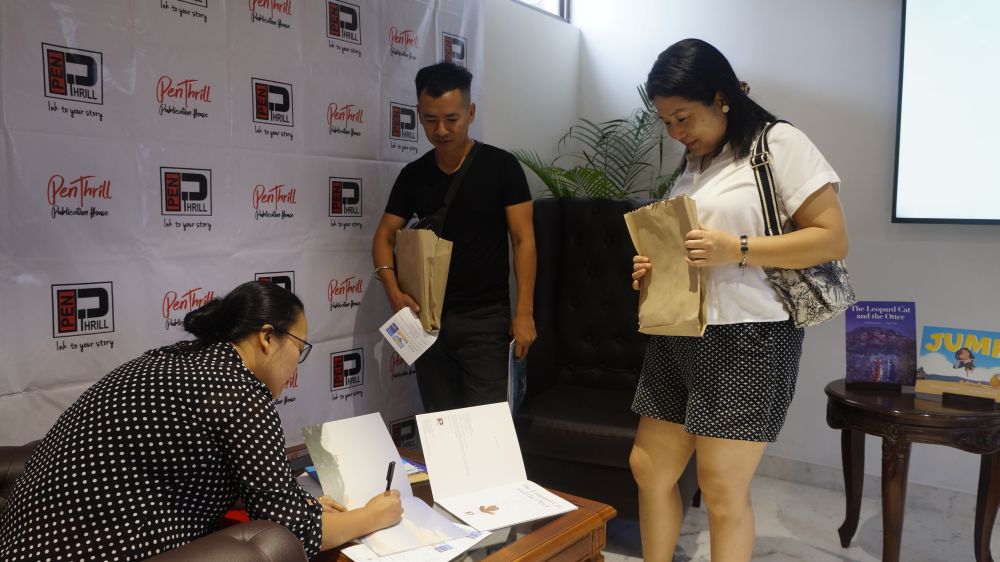Author Abokali Jimomi with Anungla Zoe Longkumer and Vishü Rita Krocha during the book launch held at The White Owl, Chümoukedima on June 24. (Morung Photo)
Morung Express News
Chümoukedima | June 24
Two children picture books, “Jump” and “The Leopard Cat and the Otter” written by Abokali Jimomi, were formally released this afternoon by Anungla Zoe Longkumer, musician, writer and filmmaker, here at The White Owl Book Lounge.
PenThrill's 72nd and 73rd publication, the books were released in a simple ceremony attended by family and friends.
Releasing the books, Longkumer lauded the author's simple, creative and honest story telling 'of us' and how it has been brilliantly morphed by the two artists – Puloto Chishi for “Jump” and Rajiv Eipe for “The Leopard Cat and the Otter.”
When she was invited, she couldn't pass up the chance, given the books being children illustrated, and the stories of our forbearers being woven in it for them to read and learn about who we are.
“These are stories told by us, about us and for us,” she said, while stressing on the significance of carrying forward the heritage that we as a people, have inherited.
Longkumer urged the young and old alike to pick up such stories which we have put aside or almost forgotten and begin “telling our stories in our own setting” to the world. Maintaining that the society today is empowered by education and technology to be able to re-eductate the younger generation through books like these, she called the gathering to be torchbearers by buying and reading such books.
Reading an excerpt from “The Danger of a Single Story,” a Ted Talk by Chimamanda Adichie, Publisher Vishü Rita Krocha in her address, said that this is where the launch of today’s publications play a significant role in changing that narrative.
Elucidating that most of the Naga readers including her, grew up reading foreign books, she could relate to Adichie and how she grew up reading British and American books.
In the last 9 years of publishing books, she has constantly come across manuscripts and stories with foreign names and places that “we, locals would not recognise.” And over the years, she would insist the emerging authors to make it locally relevant, after having learnt the importance of telling our own stories.
Krocha said that the two books would be the publication house's first picture books, while also expressing delight that the children will finally have the opportunity to grow up reading our own stories – stories that our children can relate to, that form our roots, are relevant, and stories that will shape their thinking and perspective and also help them in their journey both as readers and as Nagas.
In a recent interview, Krocha said that Jimomi had reiterated that “We need our own stories. There has always been a huge void in our lives because we didn’t grow up reading our stories.”
She said that today’s children are fortunate to have authors like her whose keen interest in documenting and telling stories of our indigenous culture, is working out for the society's greater good.
Our land is bursting with stories, and we must all endeavour to document and preserve these stories because as they say, writers are the ultimate keepers of our precious history and culture, said Krocha, while looking forward to a vibrant community of literature in the State with contributions from every end.
The author, talking about the books and sharing her story, said that she grew up in a rural space with hardly any bookstores around. Growing up in a pre-internet era, she, like others at that time, were exposed to western literature, which eventually led her to discern that they were growing up reading the stories of others and none of the books they were reading had the representation of the Nagas. Sadly, this continue to be the scenario even today, “as if Nagas are invisible people,” she continued.
Jimomi shared that during her early years, when a few others and she had embarked on the mission of writing a novel, they started to give western names to places, people, and pets. She explained that it was not the stories of the Nagas that are not interesting, but that, it was a result of consuming so much of the western literature, they could not think beyond them.
Talking about how injustices in the books “The Count of Monte Cristo,” “Nobody's Child” and the Biblical story of Joseph shaped her, she said that Shenili, the little girl in “Jump” is a character that defy stereotypes. The short story depicts an active little girl who can be happy and free as children should be. She further talked about how girls in the society are frequently told how to behave, sit and move, while it is not the case for the boys.
About “The Leopard Cat and the Otter,” Jimomi said that animals are losing their habitat and while Nagas no longer need to hunt for food, the practice continues still. She, however, admitted that some still engage in hunting for a living, making the issue complex. Priced at Rs 300 each, the books will be available at local books stores.






